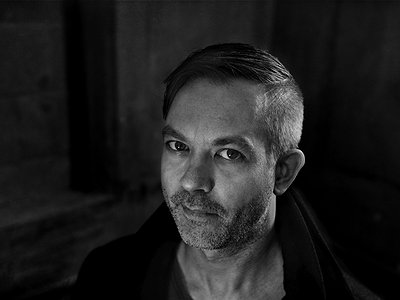How would you describe the relationship between technology and creativity for your work?
Inseparable, really. Since age 10 or so I've been involved with computers and programming and using technology to solve problems and create. The technology isn't just a conduit but it adds to the process.
Using a recent piece as an example, how do you work with your production tools to achieve specific artistic results?
I had a specific idea in mind for the track 'Dusty Yarns' that was out on the 'Recovery Mode' EP on Asymmetric in July.
I wanted a nostalgic sound, like grainy distant memories, a bit broken. I turned to a few tools to achieve that and was really pleased with the results. Psychic Modulation EchoMelt and Undertow and AudioThing Wires played a big part in creating that atmosphere along with the melody that I arrived at and I think it worked really well. 'Dusty Yarns' seemed like a perfect title.
Within a digital working environment, it is possible to compile huge archives of ideas for later use. Tell me a bit about your strategies of building such an archive and how you put these ideas and sketches to use.
I don't really build up an archive to be honest. I don't like to feel like there is a mountain of unfinished stuff lurking behind me. I sometimes spend time creating sounds which I will come back to and I often turn to a host called Cantabile as it has some really useful, selective and controlled, preset morphing and randomisation functions and that can be quite an inspiring way to arrive at new sounds and ideas. I used to use energyXT to do this too but in fact Cantabile takes it even further so I was really happy to discover that. It's a kind of hidden feature but one of the main reasons I adopted Cantabile. I'll revisit those sounds as I start putting tracks together.
The way I tend to work on tracks is to pretty quickly put together ideas in Maschine which I then save away. Usually that would be fairly short looping sections and quite often with different lengths; maybe 4-8 groups (component parts) and a few ideas or patterns for each that I might ultimately use to build out a track. WIth the Maschine JAM hardware that works really well in being able to switch patterns; I used to work in a very similar way with EnergyXT in having many different MIDI parts triggered by different notes from a controller. Those are like kernels of tracks which I'll come back to after some time and hatch a completed track from.
So, I could have a session after a week or two where I work through those ideas one by one, maybe add some more patterns and map some controllers on the Launch Control XL. It's always good to hear the sounds again on fresh ears and often I'll pick up on a sketch that I thought was a dead end and it turns out to be a polished gem. In that one session I might end up with 5-10 completed tracks from those ideas. I almost always record to a stereo master which is partly a habit from hardware days but also I think an important part of my process and imposes a limit or a sense of definitively catching a moment.
Once recorded I'll work on the audio in Reaper to get the levels and balance right, top and tail things and maybe some broad edits to the length or structure and that's that. Maybe three or four tracks are keepers and others just don't work out but it lets me mentally move on as there's a sense of completion.
Despite the aforementioned near endless possibilities, many productions seem to follow conventional paths. How do you retain an element of surprise for your own work – are there technologies which are particularly useful in this regard?
Most of my music is relatively conformal in terms of structure and melody but I think it's really important to keep a movement to the sounds and there are plenty of ways to achieve that. I'm working with polymeter and polyrhythms a lot and I think that's a hugely important factor in keeping the mind engaged.
I hate the notion of designing tracks too, it's why I've strived to use tools like energyXT, Maschine and recently Loomer Architect that don't employ a linear timeline so much or you have multiple independent timelines. That mode of performing a track and commiting to a stereo master recording allows for capturing the best moments I think. There's much more scope for an organic process and it is definitely better to record too many happy mistakes than design them out of the process altogether by having some perfectly lined up and quantised automation.
Production tools can already suggest compositional ideas on their own. How much of your music is based on concepts and ideas you had before entering the studio, how much of it is triggered by equipment, software and apps?
I tend not to really have a preset idea of what I'll make in any given session. Much less so now as creative time and energy is a luxury hard to come by. Of course there are exceptions like when I'm working on a remix or I might set myself some boundaries; a well known example of that being the first release 'Preliminary Statements' on my Asymmetric label in 1999 when I made a track by processing a single bar loop and it had an insane energy.
I wouldn't say I rely on compositional ideas from production tools but I certainly like to entertain accidents and an organic attitude when I'm producing. It's a delicate line between sheer chaos and controlled creativity that you can call your own.
How important is it for you that you personally create or participate in the creation of every element of a piece – from sound synthesis via rhythm programming to mixing?
It's impossible to take credit for every aspect especially when it comes to software, you become more of a conductor or sculptor I think, working at different levels of the process. For me ultimately there's an almost moral line beyond which you can't really say you are creating something and I try to stay well away from that line.
In the past I invested a lot of time creating my own tools for MIDI processing that would introduce a lot of movement (initially Logic's Environment then building plugins with SynthEdit and SynthMaker). You hear that a lot in my Reducer releases in the early 2000s.
That was important to me and even though I don't use those tools or have the time to develop them now I still adopt the same techniques when building tracks. I've tended to avoid obvious sampling and loops except when working on remixes and even then I'm trying more and more to reinterpret or reinvent a track by reverse engineering its melody or rhythm for example.
Have there been technologies which have profoundly changed or even questioned the way you make music?
I'm not really sure although I'm gobsmacked to see the way other people use instruments or tools in completely different ways - be it a guitar, drums, hardware sequencer, analogue modular or whatever. It doesn't necessarily make me question the way I make music but it makes me ponder how other people can do what they do and makes me want to try harder.
To some, the advent of AI and 'intelligent' composing tools offers potential for machines to contribute to the creative process. Do you feel as though technology can develop a form of creativity itself? Is there possibly a sense of co-authorship between yourself and your tools?
There's definitely the potential for co-authorship but it's a fuzzy area and kind of depends on the role the artist is adopting or assuming or taking credit for too. Philosophically I wonder if the creator of the technology is the co-author or the technology itself is.
I've definitely stumbled across software and tools where you feel like you have had 5% input and impact in terms of the creative process so it doesn't feel right; crazy stuff in Reaktor or Max For Live for example. Fun and there can definitely be a sense that you are commanding something but not in the sense that you have created something yourself and I think that is when the argument for artistry has been lost.
I can see similarities with the interesting legal conundrums around self-driving cars and so on. Who's to blame if the car crashes becomes the same as who's to credit for the music that's been produced.
Do you personally see a potential for deeper forms of Artificial Intelligence in your music?
I'm not sure but I expect it will be inevitable. Developers will try to squeeze more and more AI features into software, preset imaginators, melody combobulators and all sorts. Whether they are of any creative value, for my music, will remain to be seen and perhaps stuff is already happening but imperceptibly. AI has won if that's the case.
I'm quite happy with some controlled/parameterised randomisation at this point and yet to see what AI or neural networks will bring to the party. That said, there are some really nice ideas out there already like the Patternarium for Sonic Charge Microtonic. I'm never quite sure where the lines are between algorithmic, generative, neural networks and AI.
What tools/instruments do you feel could have a deeper impact on creativity but need to still be invented or developed?
Other than the Preset Imaginator and Melody Combobulator? I should get those patents registered ... (laughs)



